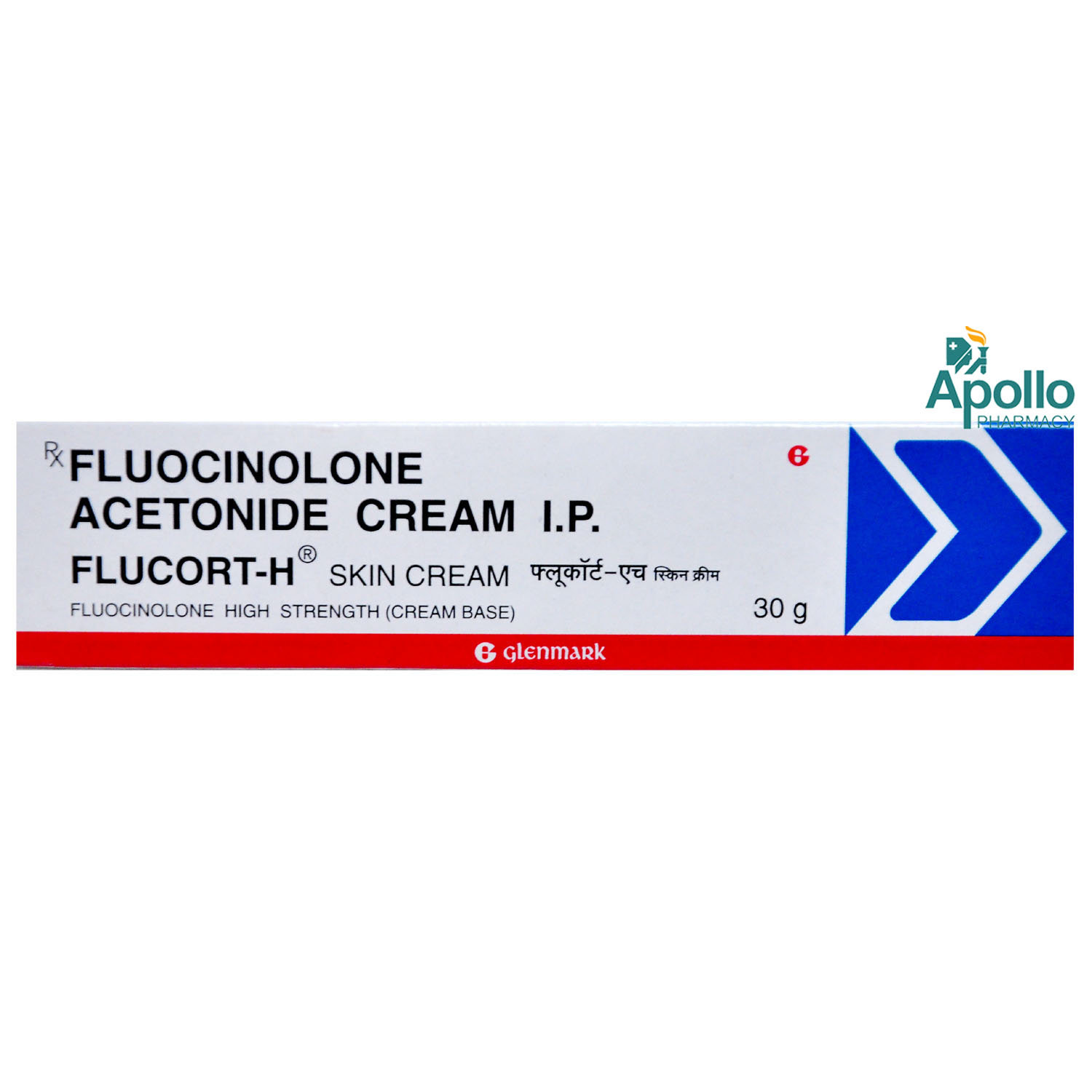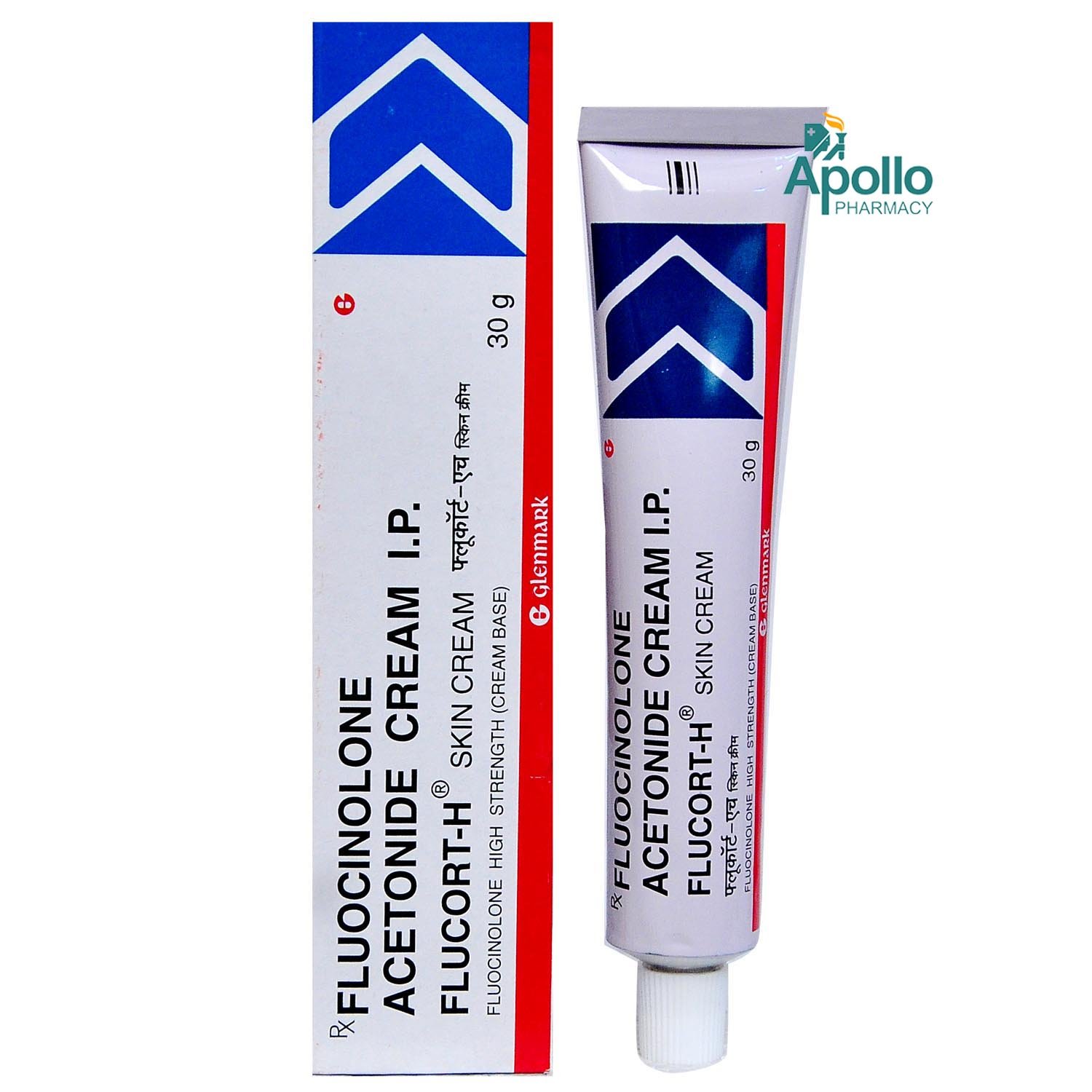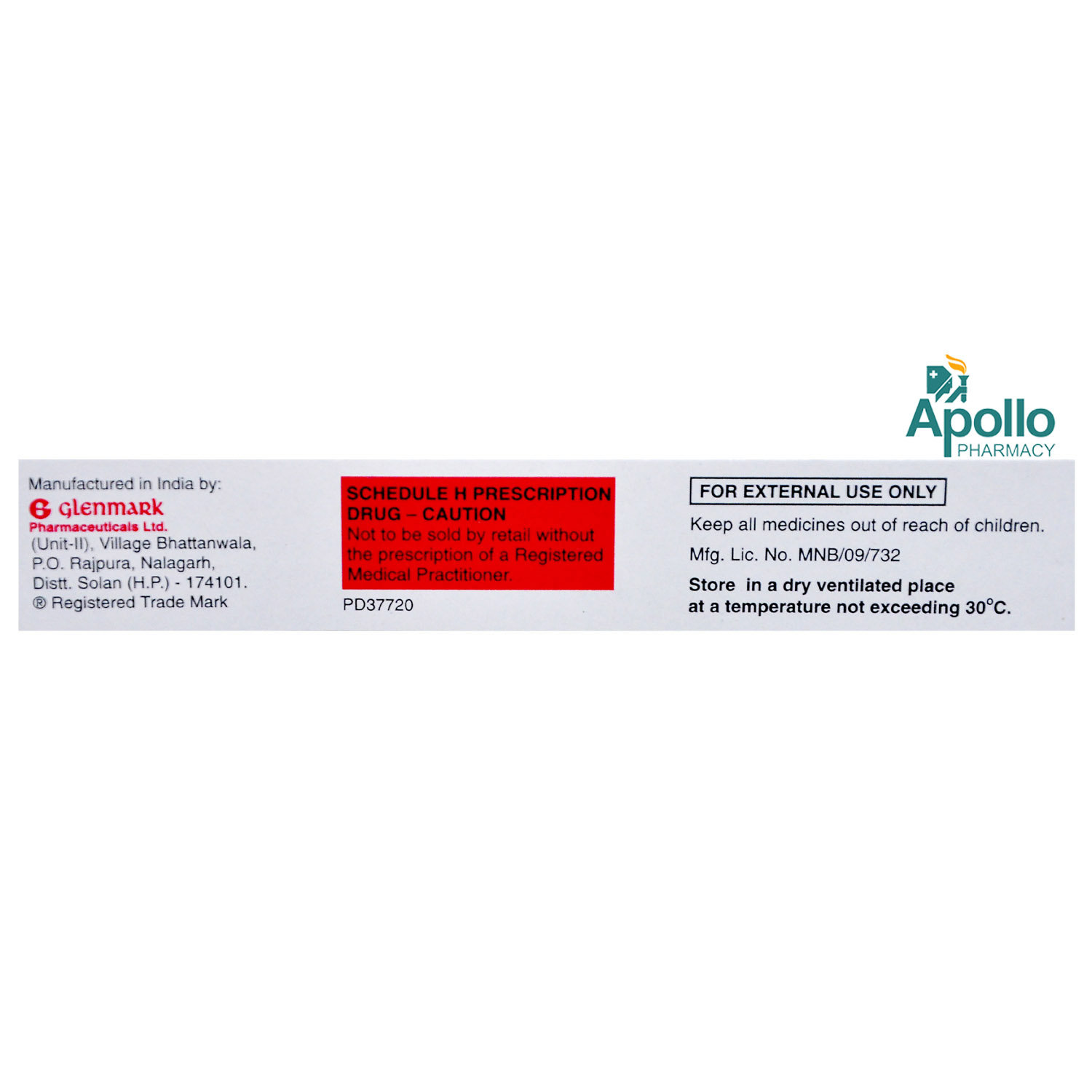Flucort-H Skin Cream 30 gm
MRP ₹212.5
(Inclusive of all Taxes)
₹31.9 Cashback (15%)
Provide Delivery Location
Online payment accepted
 Prescription drug
Prescription drugWhats That
Composition :
Manufacturer/Marketer :
Consume Type :
Expires on or after :
Return Policy :
About Flucort-H Skin Cream
Flucort-H Skin Cream belongs to the class of medications called ‘Corticosteroids’ used to treat inflammation and itching caused by skin conditions such as seborrheic dermatitis, psoriasis, eczema and dermatitis. Seborrheic dermatitis is the inflammation of the oily glands present in the skin. Psoriasis is an autoimmune disorder that results in itchy and scaly rashes on the skin. Eczema is the red and itchy rashes on the skin that occur due to allergens such as pollen, food or other irritants. Dermatitis is a generalized term for inflammation of the skin.
Flucort-H Skin Cream contains ‘fluocinolone acetonide’ which belongs to the class of ‘corticosteroids’. It reduces the release of inflammatory mediators (chemicals that cause inflammation). It causes constriction of blood vessels decreasing the access of cells to the site of injury. This effect helps in reducing the swelling, pain, itching and discomfort.
Flucort-H Skin Cream is for topical use. You should take this medicine as prescribed by your doctor. The common side-effects of Flucort-H Skin Cream are burning or itching sensation at the site of application, body aches or pain, cough, sore throat, fever, headache, lightening of normal skin colour or treated areas of dark skin, stuffy or runny nose, tender, swollen glands in the neck, trouble swallowing, unusual tiredness or weakness and voice changes.
Do not take Flucort-H Skin Cream if you are allergic to ‘fluocinolone acetonide’ or any ingredients present in it. Before taking Flucort-H Skin Cream, inform your doctor if you have any skin infection, history of reaction to any steroid, liver disease or an adrenal gland disorder. Inform your doctor if you are taking prescription, non-prescription medicines, herbal products or dietary supplements. Also, tell your doctor if you are pregnant or breastfeeding.
Uses of Flucort-H Skin Cream
Directions for Use
Key Benefits
Flucort-H Skin Cream contains ‘fluocinolone acetonide’ which belongs to the class of ‘corticosteroids’. It is effectively used to treat various inflammatory, allergic and autoimmune diseases. It works by interfering with the inflammation process. It reduces the release of chemicals that cause inflammation. It causes constriction (narrowing) of blood vessels, decreasing the access of cells to the site of injury. This effect helps in reducing the swelling, redness, itching and discomfort.
Storage
- Maintain a healthy lifestyle by consuming a well-balanced diet, avoiding sodium, alcohol, and caffeine intake, and ensuring proper hydration.
- Practice regular physical activity to increase circulation and maintain a healthy weight.
- Manage stress effectively and ensure sufficient sleep.
- Monitor your weight and any swelling, and consult a doctor if your symptoms worsen.
- Avoid smoking and follow medical advice to avoid complications.
- Body pain can be treated with regular exercise or yoga, which includes mild stretching, which helps strengthen the lower body.
- Warm baths and gentle massage of the affected parts can help relieve pain.
- Avoid strenuous activity and take frequent breaks, as rest is critical.
- Intake of nutritious food can help strengthen body and mind. A trained nutritionist can help design a balanced diet for strengthening your body.
- Speak to your doctor if the pain lasts an extended period. Medical help can be practical in finding a cure for constant body pain.
- Tell your doctor about the cough symptoms you're experiencing, which may be triggered by your medication.
- Your doctor may adjust your treatment plan by changing your medication, adding new medications, or providing guidance on managing your cough symptoms.
- Practice good hygiene, including frequent handwashing, avoiding close contact with others, and avoiding sharing utensils or personal items.
- Stay hydrated by drinking plenty of fluids, such as water, tea, or soup, to help thin out mucus and soothe your throat.
- Get plenty of rest and engage in stress-reducing activities to help your body recover. If your cough persists or worsens, consult your doctor for further guidance.
- Moisturize frequently with thick, broad-spectrum moisturizers containing sunscreen.
- Use warm water for short baths, and gentle cleansers.
- Pat dry and apply moisturizer immediately.
- Use a humidifier to add moisture to the air, and choose breathable fabrics like cotton and silk.
- Wash clothes with fragrance-free detergents to minimize irritation.
- Inform your doctor immediately if you experience a fever after starting a new medication.
- Your doctor may adjust your medication regimen or dosage as needed to minimize fever symptoms.
- Monitor your body temperature to monitor fever progression.
- Drink plenty of fluids, such as water or electrolyte-rich beverages, to help your body regulate temperature.
- Get plenty of rest and engage in relaxation techniques, such as deep breathing or meditation, to help manage fever symptoms.
- Under the guidance of your doctor, consider taking medication, such as acetaminophen or ibuprofen, to help reduce fever.
- If your fever is extremely high (over 103°F), or if you experience severe symptoms such as confusion, seizures, or difficulty breathing, seek immediate medical attention.
- Hydrate your body: Drink enough water to prevent dehydration and headaches.
- Calm Your Mind: Deep breathing and meditation can help you relax and relieve stress.
- Rest and Recharge: Sleep for 7-8 hours to reduce headache triggers.
- Take rest: lie down in a quiet, dark environment.
- Cold or warm compresses can help reduce tension.
- Stay Upright: Maintain good posture to keep symptoms from getting worse.
- To treat headaches naturally, try acupuncture or massage therapy.
- Over-the-counter pain relievers include acetaminophen and ibuprofen.
- Prescription Assistance: Speak with your doctor about more substantial drug alternatives.
- Severe Headaches: Seek emergency medical assistance for sudden, severe headaches.
- Frequent Headaches: If you get reoccurring headaches, consult your doctor.
- Headaches with Symptoms: Seek medical attention if your headaches include fever, disorientation, or weakness.
- To keep your vocal cords lubricated and hydrated, drink lots of water.
- Suck on ice chips, popsicles, or lozenges to clear your throat and reduce hoarseness.
- Your voice cords may be soothed and healed by honey's antibacterial and anti-inflammatory properties.
- Gargle with salt water.
- Using a steam humidifier or inhaling steam might help minimize hoarseness and release mucus.
Drug Warnings
Flucort-H Skin Cream should not be applied to damaged skin or open wounds. It should be used with caution in children as it may delay growth. It can increase your risk of infections as it can suppress the immune system. It should be used with caution in patients with diabetes, liver disease and skin infections. Inform your doctor if you are pregnant or breastfeeding.
Drug-Drug Interactions
Drug-Drug Interactions
Login/Sign Up
Drug-Food Interactions
Drug-Food Interactions
Login/Sign Up
Diet & Lifestyle Advise
- Eat a healthy and balanced diet and make sure you sleep at least 8 hours a day for a speedy recovery.
- Include heart-healthy omega 3 fatty acid containing food drinks in your daily diet. You can also use low-fat cooking oil like olive oil, soybean oil, canola oil and coconut oil.
- Avoid contact with any person who is having chickenpox, measles, tuberculosis as it might cause you the same infection as Flucort-H Skin Cream makes your body prone to infections.
- Opt for food and drinks high in Omega 3 fatty acid to get relief from pain, swelling and inflammation. Omega 3 fatty acid-enriched foods include flaxseeds, walnut, soybean oil, salmon and tuna fish if you prefer non-veg.
- Prefer more whole foods and grains instead of processed ones. Limiting starch may also help decrease inflammation.
- Avoid intake of processed foods, foods high in sugar and fat, as these may cause inflammation.
- Try to fill half your food plate with fruits and veggies.
- Limit salt intake and prefer herbs or spices like garlic, ginger and turmeric, a natural anti-inflammatory.
- Avoid alcohol as it can affect your stomach and intestine and limit the absorption of the important nutrients required by your body.
Side Effects of Flucort-H Skin Cream
- Burning or itching sensation at the site of application
- Body aches or pain
- Cough
- Sore throat
- Fever
- Headache
- Hoarseness
- Lightening of normal skin colour or treated areas of dark skin
- Stuffy or runny nose
- Tender
- Swollen glands in the neck
- Trouble swallowing
- Unusual tiredness or weakness
- Voice changes
Habit Forming
Therapeutic Class
All Substitutes & Brand Comparisons
RX
Out of StockFluon H 0.1% Cream
Parry Pharma Pvt Ltd
₹71.42
(₹4.29/ 1gm)
32% CHEAPER
Drug-Diseases Interactions
Drug-Diseases Interactions
Login/Sign Up
FAQs
Drug-Drug Interactions Checker List
- DESMOPRESSIN
- MACIMORELIN
- NADROPARIN
- BEMIPARIN
- SARGRAMOSTIM
Special Advise
- Do not use if there is an infection or sore in the area to be treated.
- Though it is unlikely, Flucort-H Skin Cream may temporarily slow down a child's growth if used for a long time. See the doctor regularly so your child's height can be checked.
Disease/Condition Glossary
Seborrheic dermatitis: Seborrheic dermatitis is a skin condition that causes an itchy rash with dry, flaky scales on the skin that contains oil glands such as the scalp, face, back, and upper chest.
Psoriasis: An autoimmune (immune system attacks healthy cells) skin disorder in which the skin becomes scaly, swelled up, and itchy.
Dermatitis: It is a skin condition that causes itchy, dry skin, or a rash on swollen, reddened skin.
Eczema: It is also called atopic dermatitis. It is a condition in which red and itchy rashes are seen on the skin, especially on the arms. It occurs due to allergens such as pollen, any foods, or other irritants such as soap.

Have a query?
Alcohol
Safe if prescribed
Consumption of alcohol may increase the risk of side-effects.
Pregnancy
Consult your doctor
Flucort-H Skin Cream is a category C medicine. It should be used with caution in pregnant women as it may harm the unborn baby.
Breast Feeding
Consult your doctor
Flucort-H Skin Cream may get excreted in the breast milk. So, it should be used with caution in breastfeeding mothers.
Driving
Safe if prescribed
Flucort-H Skin Cream may not affect the ability to drive.
Liver
Consult your doctor
Flucort-H Skin Cream should be used with caution in patients with liver diseases. Dose adjustments may be necessary.
Kidney
Consult your doctor
Flucort-H Skin Cream should be used with caution in patients with kidney diseases. Dose adjustments may be necessary.
Children
Safe if prescribed
Flucort-H Skin Cream should be used with caution in children as it may affect growth.










